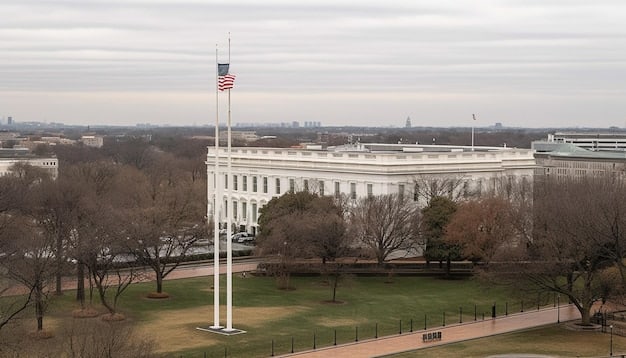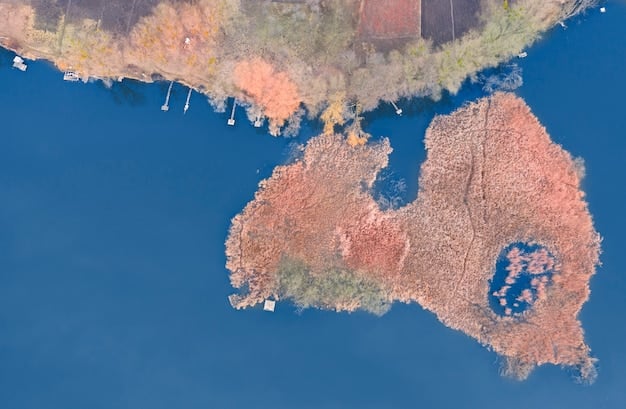US State Department Priorities in 2025: A Comprehensive Overview

The key priorities of the US State Department in 2025 will likely focus on navigating geopolitical tensions, promoting global stability, addressing transnational challenges like climate change and pandemics, and strengthening alliances to advance US interests and values.
Understanding the future direction of US foreign policy requires a close look at the State Department’s priorities. What challenges and opportunities will shape its agenda in 2025? This article explores the likely key areas of focus, from global security to climate action, offering insights into the department’s strategic objectives.
Anticipating Geopolitical Shifts Affecting US Foreign Policy
The geopolitical landscape is constantly evolving, and in 2025, the US State Department will need to adapt to significant shifts in global power dynamics. Understanding these changes is crucial for formulating effective foreign policy strategies.
Great Power Competition
Competition among major global powers, particularly the United States, China, and Russia, will continue to be a central theme. This competition spans various domains, including economic, military, and technological. The State Department will be tasked with managing these rivalries while seeking cooperation where possible.
Regional Conflicts and Instability
Several regions around the world are experiencing ongoing conflicts and instability. From the Middle East to Eastern Europe, these crises demand diplomatic attention and engagement. The State Department will play a key role in conflict resolution, humanitarian assistance, and stabilization efforts.
- Maintaining open communication channels with all relevant parties.
- Implementing targeted sanctions and incentives to influence behavior.
- Working with international organizations to address shared threats.
In navigating these geopolitical shifts, the State Department’s ability to anticipate and respond effectively will be vital for protecting US interests and promoting global stability. Strategies should focus on fostering diplomatic solutions, strengthening alliances, and addressing the root causes of conflict.

Combating Terrorism and Violent Extremism
Terrorism remains a persistent and evolving threat, necessitating continuous efforts to combat violent extremism both domestically and internationally. The State Department is pivotal in coordinating global counterterrorism initiatives and working with allies to prevent attacks.
Counterterrorism Strategies
Effective counterterrorism strategies require a multifaceted approach, including intelligence gathering, law enforcement cooperation, and addressing the underlying factors that contribute to radicalization. The State Department is committed to disrupting terrorist networks, countering extremist ideologies, and preventing the flow of foreign fighters.
International Partnerships
Building strong international partnerships is essential for combating terrorism effectively. The State Department collaborates with foreign governments, international organizations, and civil society groups to share information, coordinate efforts, and build capacity in regions vulnerable to extremism.
To effectively combat terrorism, the State Department will need to foster intelligence sharing, engage in diplomatic efforts and provide resources and training to countries to assist them in countering extremism, and ensure a coordinated strategy.
Addressing Climate Change and Environmental Issues
Climate change presents a significant global challenge, demanding urgent action and international cooperation. The US State Department recognizes the importance of addressing climate change and other environmental issues as integral components of its foreign policy agenda.
International Agreements and Commitments
The United States is committed to adhering to international agreements and commitments aimed at reducing greenhouse gas emissions and promoting sustainable development. The State Department actively participates in global climate negotiations and works to facilitate the implementation of climate-related policies.
Promoting Renewable Energy and Sustainable Practices
Transitioning to clean energy sources and adopting sustainable practices are essential for mitigating the impacts of climate change. The State Department supports initiatives that promote renewable energy technologies, energy efficiency, and sustainable resource management.
- Investing in climate-resilient infrastructure.
- Promoting climate-smart agriculture.
- Protecting and restoring natural ecosystems.
Promoting Global Health Security
Global health security has emerged as a critical priority, particularly in light of recent pandemics and infectious disease outbreaks. The US State Department is committed to strengthening global health systems, preventing the spread of diseases, and ensuring access to healthcare for all.
Pandemic Preparedness and Response
Preparing for and responding to pandemics requires coordinated international efforts and investments in public health infrastructure. The State Department works with global partners to enhance disease surveillance, develop vaccines and treatments, and strengthen healthcare systems in vulnerable regions.
Global Health Initiatives
Several global health initiatives, such as the Global Fund to Fight AIDS, Tuberculosis and Malaria, and Gavi, the Vaccine Alliance, play a crucial role in addressing major health challenges worldwide. The State Department supports these initiatives through funding, technical assistance, and diplomatic engagement.
In 2025, the State Department must prioritize investments in healthcare infrastructure and research, strengthen international collaboration, and ensure equitable access to healthcare resources to promote global health security effectively.

Advancing Human Rights and Democracy
Promoting human rights and democratic values is a cornerstone of US foreign policy. The State Department is dedicated to supporting civil society, advocating for political freedoms, and holding human rights abusers accountable.
Supporting Civil Society Organizations
Civil society organizations play a vital role in promoting democracy, defending human rights, and advocating for social justice. The State Department provides funding and technical assistance to support these organizations and empower them to effect positive change.
Promoting Free and Fair Elections
Free and fair elections are essential for democratic governance and political stability. The State Department supports electoral reforms, monitors elections, and promotes voter participation to ensure that electoral processes are credible and transparent.
- Implementing sanctions against individuals and entities involved in human rights abuses.
- Supporting international tribunals and accountability mechanisms.
- Promoting truth and reconciliation processes in post-conflict societies.
Strengthening Alliances and Partnerships
Maintaining strong alliances and building strategic partnerships are essential for advancing US interests and promoting global stability. The State Department is committed to strengthening relationships with key allies and partners around the world.
Bilateral and Multilateral Engagements
Through bilateral and multilateral engagements, the State Department fosters dialogue, cooperation, and collaboration on a wide range of issues. These engagements provide opportunities to address shared challenges, advance common interests, and strengthen diplomatic ties.
Security Cooperation
Security cooperation is a critical component of US alliances and partnerships. The State Department works with allies and partners to enhance military capabilities, conduct joint exercises, and address common security threats.
In 2025, the State Department needs to focus on reinforcing alliances, expanding partnerships, and enhancing security cooperation to maintain US influence and ensure effective responses to evolving global challenges. Strategies should focus on promoting mutual interests, addressing shared threats, and fostering trust.
In summary, the US State Department’s priorities in 2025 will be deeply intertwined with the need to navigate geopolitical tensions, address global challenges, and strengthen relationships with allies. By focusing on these key areas
| Key Point | Brief Description |
|---|---|
| 🌍 Geopolitical Shifts | Adapting to new power dynamics and regional conflicts is crucial. |
| 🛡️ Combating Terrorism | Continuous efforts to disrupt terrorist networks internationally. |
| 🌱 Climate Action | Reducing emissions and promoting sustainability globally. |
| 🤝 Strengthening Alliances | Maintaining and building robust international partnerships. |
What are the Key Priorities of the US State Department in 2025?
▼
The primary focus will likely involve managing competition, addressing human rights concerns, and seeking cooperation on issues like climate change. This requires multi-faceted engagement.
▼
The State Department will seek to enhance international agreements, promote renewable energy, and support climate resilience initiatives around the globe.
▼
It involves strengthening global health systems, preparing for future pandemics, and ensuring equitable access to healthcare resources worldwide.
▼
By supporting civil society organizations, promoting fair elections, and holding human rights abusers accountable through various international mechanisms. The goal is to defend political freedoms.
▼
Priorities include reinforcing alliances with traditional partners and building new strategic partnerships to address shared challenges and maintain global stability effectively.
Conclusion
In conclusion, the US State Department’s priorities in 2025 will center on navigating geopolitical complexities, combating transnational threats, and upholding democratic values. These efforts are crucial for safeguarding US interests and contributing to a more stable and prosperous world.





